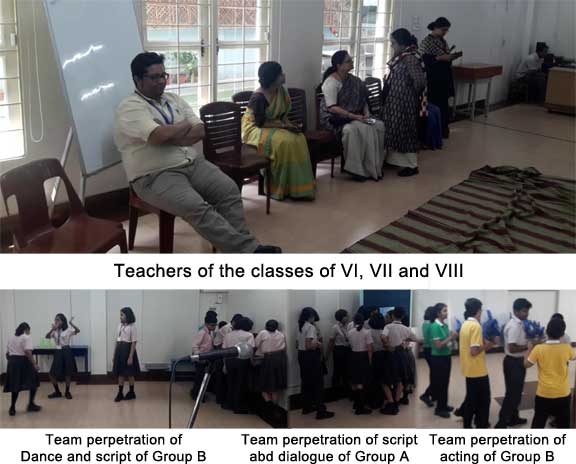Nandan Bhattacharya
We are living in a self-centric world, where egocentrism predominates ecocentrism and selfishness, altruism. Old social values are evaporating; the concepts of national integrity, communal harmony and tolerance of the other are humiliated daily. Under these circumstances, the learning of social values in school is essential. Teachers must play the chief role of building such values as well as the mindset of students. While moral values and kindness lessons can and should be incorporated in regular classroom teaching, other opportunites to expose children to model behaviour should not be lost. The performing arts are considered to be one of the most effective methods in this regard.
Keeping this in mind a workshop was organized by the Department of Bengali at Future Foundation School, Kolkata comprising 100 students of classes VI, VII and VIII. Two groups were formed of 50 students each. They were briefed by the facilitator on what to do and how to proceed. The students were in-charge of developing stories, learning to perform them and enhance that performace with background music as well. The students who were not directly involved in the play were asked to dance in the background, sing songs and paint according to the stroy. Thus, all students were involved in the process.
The first group (Group A) performed the story of a blind old man finding it difficult to cross the road and being ignored by other pedestrians. But a group of children going home from school help the poor man and are blessed by him for their kindness and assistance. The students painted a perfect backdrop to this this story and used a song on an oldage home (Bridhhashram) by Nachiketa Chakraborty, famous Bengali singer for background music.
The second group (Group B) performed a story on communal harmony. A young couple after an inter-religious marriage faces problems in the society and finally their child bridges the two fighting families. This group performed a dance drama and also had a painted backdrop.

Several facts were observed during the two hour performance. At the preparation stage, the facilitator left the room intentionally and observed the children from a distance, hidden from view. It was seen that even in the absence of the facilitator, the children continued with their planning and preparation. In fact, they did not notice the facilitator’s absence at all. This clearly shows the efficacy of self motivated learning that performing arts can provide. Each group selected their own team leader and the team leaders discussed matters with the subgroups. After agreeing on the idea and coordination between subgroups, further discussion took place amongst the teammates of the subgroups. Perfect democracy was on display. Short tempers and egos did flare up, but this was solved by the teammates themselves keeping in mind the importance of performance. It can be clearly stated that Theatre In Education not only brings forth and caters to the issues of social values but at the same time it enhances and teaches other life skills and good practices.
Two inferences can be drawn from this workshop. Firstly, both the groups imagined children as protagonists clearly indicating their understanding of their social responsibilities. Secondly, instead of using only one single form of the performing arts, a collaboration of different art forms are more effective in such teaching-learning.
The author by profession is Assistant Director, UGC – Human Resource Development Centre, Jadavpur University. His field of research is theatre, ecology and education. He has been practicing theatre, specially applied theatre (Theatre in Education, Forum Theatre) for a decade. He can be reached at asstdirhrdc@jadavpuruniversity.in.
